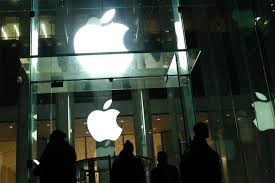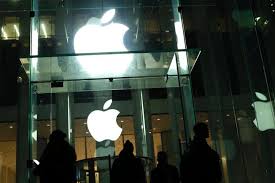
Asking a judge to support Apple Inc in its encryption battle with the U.S. government, tech industry leaders including Alphabet Inc's Google, Facebook Inc, Microsoft Corp, AT&T and more than two dozen other Internet and technology companies filed legal briefs on Thursday.
The breadth of Silicon Valley's opposition to the government's anti-encryption effort, a position endorsed by the United Nations human rights chief was displayed by the rare display of unity and support from Apple's sometime-rivals.
The Federal Bureau of Investigation obtained a court order requiring the company to write new software to disable passcode protection and allow access to an iPhone used by one of the shooters in the December killings in San Bernardino, California and the battle with Apple broke out after that.
Apple asked that the order be vacated arguing that such a move would set a dangerous precedent and threaten customer security. This has brought to the forefront a long-running debate over how much law enforcement and intelligence officials should be able to monitor digital communications.
Amicus briefs - a form of comment from outside groups common in complex cases - to U.S. District Judge Sheri Pym, in Riverside, California were filed by Apple's industry allies along with several privacy advocates. A Thursday date was set for the same.
Amicus brief opposing Apple was also filed by six relatives of San Bernardino attack victims on Thursday. Amicus brief in favor of the government were filed by three California law enforcement groups, three federal law enforcement groups and the San Bernardino district attorney.
Apple’s argument that the 1789 All Writs Act at the heart of the government's case cannot be used to force companies to create new technology was largely echoed by the companies backing Apple.
Arguments that the Congress has already passed laws that establish what companies could be obliged to do for the government, and that the court case amounted to an "end run" around those laws were also filed in one amicus filing from a group of 17 Internet companies including Twitter Inc and LinkedIn Corp.
Congress, not the courts, needed to address the issue, asserted Apple and some of the other briefs. For years the Congress has struggled without success to address law-enforcement concerns about encryption.
The government had a valid warrant, and "one does not enjoy the privacy to commit a crime," argued the victims’ families and said that Apple's arguments were misplaced. Apple "routinely modifies its systems" to comply with Chinese government directives, asserted the families.
On the grounds that computer code is a form of expression and cannot be coerced, a free speech agreement has also been advanced by Apple.
"This is the electronic equivalent of unlocking a door - no expression is involved at all," said the families pushing back in defense.
"A successful case against Apple in the U.S. will set a precedent that may make it impossible for Apple or any other major international IT company to safeguard their clients' privacy anywhere in the world”, warned Zeid Ra'ad Al Hussein, U.N. High Commissioner for Human Rights and urged U.S. authorities to proceed with "great caution".
"It is potentially a gift to authoritarian regimes, as well as to criminal hackers," he said in a statement.
(Source:www.reuters.com)
The breadth of Silicon Valley's opposition to the government's anti-encryption effort, a position endorsed by the United Nations human rights chief was displayed by the rare display of unity and support from Apple's sometime-rivals.
The Federal Bureau of Investigation obtained a court order requiring the company to write new software to disable passcode protection and allow access to an iPhone used by one of the shooters in the December killings in San Bernardino, California and the battle with Apple broke out after that.
Apple asked that the order be vacated arguing that such a move would set a dangerous precedent and threaten customer security. This has brought to the forefront a long-running debate over how much law enforcement and intelligence officials should be able to monitor digital communications.
Amicus briefs - a form of comment from outside groups common in complex cases - to U.S. District Judge Sheri Pym, in Riverside, California were filed by Apple's industry allies along with several privacy advocates. A Thursday date was set for the same.
Amicus brief opposing Apple was also filed by six relatives of San Bernardino attack victims on Thursday. Amicus brief in favor of the government were filed by three California law enforcement groups, three federal law enforcement groups and the San Bernardino district attorney.
Apple’s argument that the 1789 All Writs Act at the heart of the government's case cannot be used to force companies to create new technology was largely echoed by the companies backing Apple.
Arguments that the Congress has already passed laws that establish what companies could be obliged to do for the government, and that the court case amounted to an "end run" around those laws were also filed in one amicus filing from a group of 17 Internet companies including Twitter Inc and LinkedIn Corp.
Congress, not the courts, needed to address the issue, asserted Apple and some of the other briefs. For years the Congress has struggled without success to address law-enforcement concerns about encryption.
The government had a valid warrant, and "one does not enjoy the privacy to commit a crime," argued the victims’ families and said that Apple's arguments were misplaced. Apple "routinely modifies its systems" to comply with Chinese government directives, asserted the families.
On the grounds that computer code is a form of expression and cannot be coerced, a free speech agreement has also been advanced by Apple.
"This is the electronic equivalent of unlocking a door - no expression is involved at all," said the families pushing back in defense.
"A successful case against Apple in the U.S. will set a precedent that may make it impossible for Apple or any other major international IT company to safeguard their clients' privacy anywhere in the world”, warned Zeid Ra'ad Al Hussein, U.N. High Commissioner for Human Rights and urged U.S. authorities to proceed with "great caution".
"It is potentially a gift to authoritarian regimes, as well as to criminal hackers," he said in a statement.
(Source:www.reuters.com)





